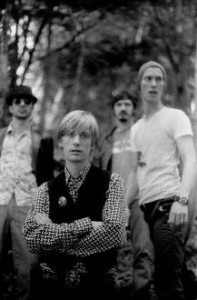 By Jae-Ha Kim
By Jae-Ha Kim
Chicago Sun-Times
November 18, 1996
With his saucer-sized eyes and wispy blond bangs, Kula Shaker vocalist-guitarist Crispian Mills didn’t look like he could cause much damage when his band made its Chicago debut Saturday night at the Double Door.
But looks are deceiving. While Mills’ angelic face may be that of a pinup boy, the 23-year-old musician is a rightful heir to the rock-god throne.
He is a frontman who oozes charisma and confidence, minus the arrogance. More importantly, Mills has a distinctive voice that is as capable of handling Far Eastern mantras as blues-based numbers.
Kula Shaker wears its ’60s influences well, but band members are not blatant thieves. The English group – which also includes bassist Alonza Bevan, organist Jay Darlington and drummer Paul Winter-Hart – is a first-rate band that soaks up musical diversity. Its biggest U.K. hits aren’t even sung in English. “Govinda” and “Tattva,” which is getting airplay in the United States, are sung primarily in Sanskrit. While Indian music isn’t easily embraced by most Westerners, Kula Shaker’s versions are hummable (if not singable) because the musicians inject them with wah-wah guitars and pop hooks.
Despite their ethnic influences and Euro look (Paul Weller hair, trendy trousers that appeared to be swiped from the women’s department), Kula Shaker actually sounds more American than many homegrown groups. They infused R & B into songs such as their set opener “Hey Dude,” sounding like the Black Crowes wish they could.
While the band is enjoying immense popularity in Europe, the musicians refused to pull any star trips at the Double Door, not even when Bevan broke a guitar string. As a roadie scrambled to help Bevan replace the string, Mills quipped, “We’re not a very rich band so we only have one bass . . . In the meantime, I’d like to play a song from my upcoming solo album.”
Starting without his bassist, Mills segued into Kula Shaker’s opus, “Grateful When You’re Dead/Jerry Was There.” (The song was written prior to Jerry Garcia’s death.)
They played most of their debut album “K,” but a highlight was when they performed a revved-up cover of “Hush,” which was a hit for Deep Purple in 1968.
As fans trickled out after the concert, a young man said to his date, “We’re going to be able to say we saw them way back when.”
His friends should be jealous. There’s still 1 1/2 months to go before 1996 is over, but it’s not likely I’ll see a better performance than Kula Shaker’s this year. The band is in a league all its own.
Unfortunately, the best that can be said about Rasputina’s opening set is that it was short. The three women (and one man) accompanied themselves on cellos and sang unmemorably wispy tunes about nothing.